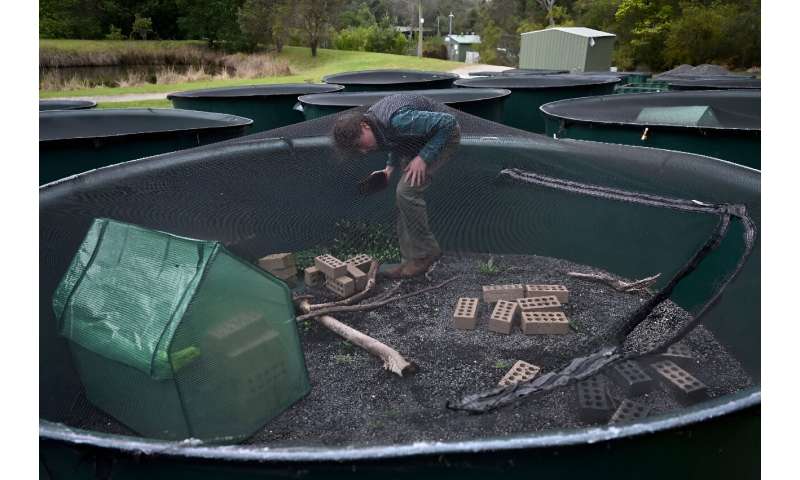
Hundreds of endangered Australian Green and Golden Bell frogs huddle inside a sauna, shielded from Sydney’s winter chill.
The sauna -– a small greenhouse containing black-painted bricks warmed by the sun—may be pleasant, but it also protects the frogs from a deadly chytrid fungus that would otherwise drive them to extinction.
Macquarie University biologist Anthony Waddle holds one frog—no bigger than a credit card—in his hand as its green and gold colours become more vibrant in the heat.
“Chytrid is the worst pathogen ever”, he told AFP.
It is a water-borne disease that burrows into the frogs’ skin, attacking their bodies and eventually killing them.
Waddle said that globally, the disease has caused the decline of 500 amphibian species and driven 90 to extinction -– six in Australia.
“Nothing has ever caused this much devastation,” he told AFP. “In Australia, we have frogs that only live in glass boxes now. This is a huge, ongoing problem.”
But Waddle’s dollhouse-sized saunas could change that.
In their warm interiors, the deadly chytrid fungus cannot grow on the frogs, allowing them to fight off the infection and survive.

‘No one solution’
Frogs play a vital role in the environment and are known as bioindicators, which are used to assess the health of ecosystems.
Without the amphibians, entire ecosystems can collapse.
Globally, 41 percent of frog species are threatened with extinction, making them one of the most vulnerable invertebrate groups, a recent study by the International Union for Conservation of Nature found.
Some of the biggest drivers include loss of habitat, climate change and the chytrid disease.
These drivers are difficult to tackle, but in the absence of a cure, Waddle hopes his frog saunas can help limit the losses.
“This might be the first evidence that we could cheaply and feasibly reduce that nasty yearly die-off of frogs,” Waddle said.
“For Green and Golden Bell frogs, that could mean the difference between a population going or persisting.”
-

More than 40 percent of global frog species are threatened with extinction.
-

The dollhouse-sized saunas only cost about $50 to assemble.
He said the saunas show that creative solutions ranging from the complex—such as identifying genes that could make individuals resistant to chytrid—to more simple are needed if frog populations are to survive.
“Not one solution is going to work for everything. Frogs are so different,” Waddle added.
But the beauty of Waddle’s saunas is that they cost AUD$70 ($US50) to assemble, and he has helped dozens of citizen scientists build their own backyard versions.
This has not only provided valuable data about endangered frog species but also saved some from the deadly fungus.
Jodi Rowley, an amphibian biologist from the Australian Museum, said the saunas showed how creative solutions could have real-world benefits.
“It’s easy to feel helpless in the face of biodiversity declines, but this study gives us a tangible way we may be able to help frogs battling a devastating fungal disease,” she told AFP.
© 2024 AFP
Citation:
Australian sauna helps save frogs from flesh-eating fungus (2024, August 30)
retrieved 30 August 2024
from https://phys.org/news/2024-08-australian-sauna-frogs-flesh-fungus.html
This document is subject to copyright. Apart from any fair dealing for the purpose of private study or research, no
part may be reproduced without the written permission. The content is provided for information purposes only.







